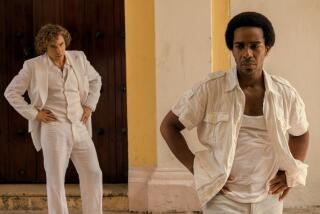A Long Trail to Sundance for Ex-Panther Jamal Joseph
Jamal Joseph, sitting back in the unaccustomed thin air of the Sundance Institute in Utah, sounds at times like just another big-city guy with a movie in his pocket.
Yes, there is a certain script he’s working on. One he will also direct, of course. And there is Greenlight Productions, the rightfully titled company he formed to make that movie and whatever else he develops, like a movie about Bob Marley.
The words are all so familiar.
Jamal Joseph, though, is up on the mountains of Robert Redford’s Sundance Institute as part of an exclusive group, people with an independent attitude about making big-screen feature movies, people who want to bring about changes in their lives and, maybe, changes in the lives of others.
As with movies, Jamal Joseph may not be exactly what the eye sees, or what the mind perceives.
Each June, the institute selects a dozen or so writers and directors from about 1,000 applicants, provides facilities, brings in actors, offers filmmaking gear, and lets the chosen few work on their projects--actual filmmaking or writing--for four weeks in the company of certifiably A-list Hollywood actors, writers, directors and producers.
Never have second-guessers been so welcome.
Some of the participants have made small, under-15-minute films but now are thinking bigger. Some have directed on stage. Some have taught. None has yet to touch all of filmmaking’s bases, to put something up on the scoreboard.
Eclectic describes this collection. There’s Elizabeth Swados, who has written and directed a number of acclaimed musicals and stage pieces, now at work on a movie musical. There’s Michael Smuin, the veteran choreographer (“Anything Goes,” “Sophisticated Ladies,” American Ballet Theatre’s 50th anniversary gala) directing his first full-length feature. There’s Bryan Gordon, the writer and director of “Ray’s Male Heterosexual Dance Hall” who won an Academy Award for his short feature and is working on a full-length feature he hopes to start this month.
And there’s Jamal Joseph, prize-winning writer, husband, father. OK so far, but watch what your eye sees, watch your perceptions.
Joseph’s bio is long: writer, director, poet, performer, short-film maker, former high school honor student.
Ex-Black Panther Party member. Ex-convict.
College graduate, University of Kansas, Leavenworth Federal Penitentiary campus.
Say Black Panther and your perception is not exactly of a guy in an Armani suit and two Land Cruisers in the carport.
Joseph, we’ll see, can be both an image and a very real substance.
At Sundance, he is directing portions of his script, “Liberated Territory: A Rite of Passage,” filming for the first time scenes from his script, something to show potential backers what he can do, what his life is about. He is also getting some direct criticism and suggestions from Hollywood people he never expected to meet during his six years in federal prison and his three in a state prison.
“Liberated Territory” is largely autobiographical, the story of young people in the turmoil of the late ‘60s--the killing of Martin Luther King Jr. and the Kennedys, the anti-war movement, Watts and other big-city riots, the black power movement.
The territory of Joseph’s movie--and of his life--is a violent New York street corner that the members of the Black Panthers had cleared of drug dealing and crime. Years later, after the breakup and imprisonment of many of the Panthers, an ex-member returns from prison. Drugs rule the territory, liberation remains a hope so slight.
“The message is clear,” he says. “Things are worse. But in the movie an old man reminds the main character, the ex-Panther, that there is work to be done. That there isn’t much time.
“You have to start at some point, at some corner. Liberation will grow from that. It’s the same thing in real life, too. The people in the communities have to make the changes. We have to reinvigorate the communities, re-energize them.”
The 39-year-old filmmaker joined the Black Panthers at age 15 following the assassination of King. Up to then he had been an honor student in school, he says. “I had been an NAACP Youth Council member. But when Dr. King was killed I felt frustrated and angry. It was time to take a stronger stand.”
He was a member of the Panthers for three years, a member of the New York “Panther 21” who were charged and eventually acquitted of conspiracy charges. Later, he was convicted of being an accessory, hiding Panther fugitives from the FBI, and later for weapons possession and use.
In his six years at Leavenworth--he calls that time “interesting”--he graduated from the University of Kansas, wrote his first collection of poetry and four plays, and formed a prison theater company. His play about a mixed group of Vietnam veterans, “Call of Duty,” was later produced in New York by the National Black Theater.
“By the time I got out of prison the Panther party didn’t exist, but its consciousness did. The members in prison had a tremendous sense of unity even though the organization had been broken up. Most of the guys were preparing to go into the community to work and to make changes. Those who survived prison now are doing relevant work. Some are professionals, some are doing social work, teaching.”
Joseph for the last three years has been artistic director of City Kids, a multicultural repertory group in New York of young people 12 to 20 who develop music and drama pieces based on their experiences. “We have a concept called Safe Space,” he says. “It gives the kids a chance to communicate their ideas to each other. It’s a place where they can be heard and where they can listen.”
He also teaches theater and film at the Harlem campus of private Touro College, which offers individual training programs for enrollees, 95% of whom are people of color, many dropouts.
Two years ago, he performed his one-man “Jamal Joseph and the Tribe” off-Broadway, a humorous, ironic look at the Panthers and prison life. He tells of Bubba, the murderer and math genius, who refuses to give away answers to a calculus final in prison. For Bubba, cheating on a test is a wrongful act.
In a more serious sense, the one-man show became a precursor, a warm-up, of the script he brought to Sundance.
“This is the first time I’ve been outside of myself,” Joseph says of the workshop program. “I took a hike one day and felt like I walked into a picture postcard. Nothing can be this real.” What is also real is shooting scenes and then talking about them with such film people as Randa Haines, Frank Pierson, Jeremy Kagan, Michael Schultz, Tom Rickman, Claire Simpson and Hume Cronyn.
“The creative advisers visit while we’re rehearsing or shooting or even while editing. If we get stuck we can ask questions. They can give advice if they want. But it’s up to each of us to resolve any problems. This is not about judgment.
“It is totally creative.”
He hopes that message can spread into other areas, into other territories. He thinks community-based programs like some that were tried by the Black Panthers are creative and worthwhile. “In the cities, people have to work at political and service programs, programs that give young people something to join and to be constructive about.
“We should think of being constructive for a change.”
So after the heady experience of the Sundance lab, what next for Jamal Joseph? Well, he has a lot of footage to show around and a script that’s going through a final polish and a lot of Hollywood first-name contacts.
And he also has a July 23 return date to Sundance, this time for a producers conference, on learning how to market movies, getting them out before the public.
How to do it all.
Now that would shake up a few perceptions left over from the terrible ‘60s.
More to Read
The biggest entertainment stories
Get our big stories about Hollywood, film, television, music, arts, culture and more right in your inbox as soon as they publish.
You may occasionally receive promotional content from the Los Angeles Times.










